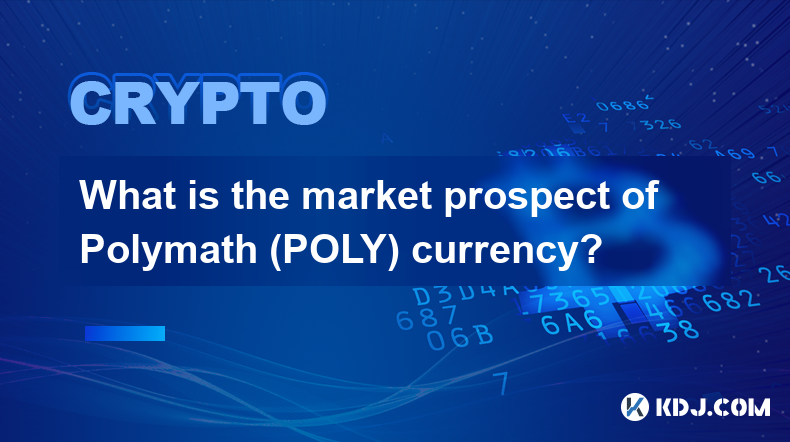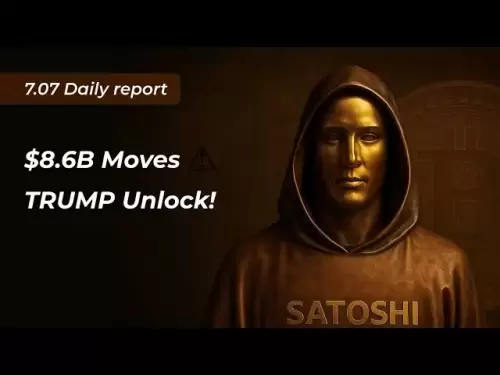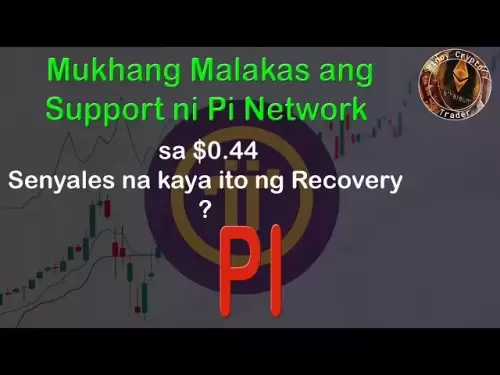-
 Bitcoin
Bitcoin $108,968.3974
0.78% -
 Ethereum
Ethereum $2,573.4732
2.10% -
 Tether USDt
Tether USDt $1.0001
-0.01% -
 XRP
XRP $2.2689
1.80% -
 BNB
BNB $662.5422
1.15% -
 Solana
Solana $151.7232
2.39% -
 USDC
USDC $0.9999
0.00% -
 TRON
TRON $0.2874
1.36% -
 Dogecoin
Dogecoin $0.1730
5.47% -
 Cardano
Cardano $0.5853
1.91% -
 Hyperliquid
Hyperliquid $39.8034
2.41% -
 Sui
Sui $2.9142
0.74% -
 Bitcoin Cash
Bitcoin Cash $495.6221
2.51% -
 Chainlink
Chainlink $13.6096
3.24% -
 UNUS SED LEO
UNUS SED LEO $9.0544
0.45% -
 Stellar
Stellar $0.2503
5.17% -
 Avalanche
Avalanche $18.2157
1.96% -
 Toncoin
Toncoin $2.8123
2.74% -
 Shiba Inu
Shiba Inu $0.0...01177
2.27% -
 Hedera
Hedera $0.1599
4.73% -
 Litecoin
Litecoin $87.6617
1.10% -
 Monero
Monero $321.3254
1.62% -
 Polkadot
Polkadot $3.3987
1.48% -
 Dai
Dai $1.0000
-0.01% -
 Ethena USDe
Ethena USDe $1.0000
-0.02% -
 Bitget Token
Bitget Token $4.4142
0.43% -
 Uniswap
Uniswap $7.3952
1.74% -
 Aave
Aave $287.2137
5.55% -
 Pepe
Pepe $0.0...01005
3.36% -
 Pi
Pi $0.4665
3.52%
What is the market prospect of Polymath (POLY) currency?
Polymath's blockchain technology fosters secure, compliant, and interoperable security tokenization, driving the transformation of digital finance by offering advantages like security, regulatory compliance, and scalability using Ethereum's blockchain infrastructure.
Dec 27, 2024 at 11:49 am

Key Points:
- Blockchain Technology and Tokenization:
- Polymath Network's Advantages:
- Market Adoption and Partnerships:
- Regulatory Landscape and Compliance:
- Token Economics and Supply Distribution:
- Team and Leadership Experience:
- Potential Investment Considerations:
Blockchain Technology and Tokenization:
Polymath is built on the Ethereum blockchain, leveraging its security and decentralized nature to create a platform for issuing and managing security tokens. Security tokens represent ownership or rights in an asset, such as real estate, equity, or debt, and are expected to play a significant role in the future of digital finance. Polymath's platform provides a standardized framework for tokenizing assets in a regulatory-compliant manner, enabling companies to access capital and investors to diversify their portfolios.
Polymath Network's Advantages:
The Polymath network offers several key advantages:
- Security: Ethereum's blockchain technology provides a secure and immutable platform for token issuance and management.
- Regulatory Compliance: The platform incorporates legal and compliance mechanisms to ensure that security tokens are compliant with relevant regulations, mitigating risks for issuers and investors.
- Interoperability: Polymath allows tokens to be easily transferred and integrated with other blockchain applications, facilitating broader adoption.
- Scalability: The Ethereum blockchain's scalability solutions allow the Polymath network to handle increasing transaction demand as the market grows.
Market Adoption and Partnerships:
Polymath has gained significant traction in the cryptocurrency community and has established partnerships with key players in the industry. Some notable partnerships include:
- TokenSoft: A leading provider of security token issuance and management solutions
- Republic: A leading equity crowdfunding platform
- Securrency: A provider of digital asset management and trading solutions
These partnerships enhance Polymath's network and increase its accessibility to a wider pool of issuers and investors.
Regulatory Landscape and Compliance:
The regulatory landscape for security tokens is still evolving, but Polymath has taken proactive steps to ensure compliance. The platform incorporates legal and regulatory frameworks to meet the requirements of different jurisdictions, including KYC/AML checks and investor accreditation requirements. This commitment to regulatory compliance reduces risks for issuers and investors and helps pave the way for wider adoption.
Token Economics and Supply Distribution:
The Polymath token (POLY) serves as the native utility token of the network. It is used for various purposes, such as:
- Transaction Fees: Holders of POLY pay transaction fees when using the Polymath platform for token issuance and management.
- Governance: POLY holders have voting rights in the network's governance process, allowing them to participate in decision-making and shape the future of the platform.
- Staking: POLY can be staked to earn rewards, contributing to the network's security and stability.
The total supply of POLY tokens is fixed at 1 billion, with a circulating supply of approximately 350 million.
Team and Leadership Experience:
Polymath has a strong and experienced team with deep knowledge in the blockchain, finance, and regulatory fields. Key members include:
- Trevor Koverko: Co-Founder and CEO, with extensive experience in blockchain technology and asset tokenization.
- Chris Housser: Co-Founder and CTO, with a strong background in software development and blockchain security.
- Paul Veradittakit: Co-Founder and CPO, with expertise in product development and strategic partnerships.
The team's expertise and industry connections contribute to Polymath's ability to innovate and drive adoption.
Potential Investment Considerations:
As with any investment, it is essential to conduct thorough research before investing in the Polymath token. Factors to consider include:
- Market Conditions: The cryptocurrency market is volatile, and the value of POLY tokens can fluctuate based on market sentiment and external factors.
- Regulatory Developments: The evolving regulatory landscape can impact the growth and adoption of security tokens, affecting the demand for POLY tokens.
- Competition: Polymath faces competition from other platforms in the security tokenization space, which can affect its market share and growth prospects.
- Technical Risk: All blockchain technologies, including Polymath, have inherent technical risks, which could affect the functionality and security of the platform.
- Team Execution: The success of Polymath depends heavily on the team's ability to execute its vision and navigate market challenges.
FAQs:
Q: What is the purpose of the Polymath platform?
A: The Polymath platform provides a standardized framework for issuing and managing legal and regulatory-compliant security tokens.
Q: What is the utility of the Polymath token (POLY)?
A: POLY tokens are used for transaction fees, governance, and staking on the Polymath network.
Q: Is the Polymath platform secure?
A: The Polymath platform utilizes the security features of the Ethereum blockchain, ensuring the secure and immutable issuance and management of tokens.
Q: How does Polymath ensure regulatory compliance?
A: Polymath incorporates legal frameworks and compliance mechanisms to meet the requirements of different jurisdictions, including KYC/AML checks and investor accreditation requirements.
Q: What are the potential risks associated with investing in Polymath?
A: Potential risks include market volatility, regulatory changes, competition, technical risks, and team execution challenges.
Disclaimer:info@kdj.com
The information provided is not trading advice. kdj.com does not assume any responsibility for any investments made based on the information provided in this article. Cryptocurrencies are highly volatile and it is highly recommended that you invest with caution after thorough research!
If you believe that the content used on this website infringes your copyright, please contact us immediately (info@kdj.com) and we will delete it promptly.
- Pi Network Price Prediction: Is $1,000 Realistic?
- 2025-07-07 14:30:13
- Cryptocurrency Fraud: Secret Service Issues Warning Amidst Rising Scams
- 2025-07-07 14:30:13
- XRP Price & Bitcoin to $3.4M by 2030? A NYC Perspective
- 2025-07-07 14:50:12
- Elon Musk's America Party & Bitcoin: A New York Minute on a Political Earthquake
- 2025-07-07 14:50:12
- Trump, BRICS, and Bitcoin Volatility: A Wild Ride in the Crypto World
- 2025-07-07 14:55:12
- Cathie Wood, Bitcoin, and Government Settlements: Decoding the Latest Crypto Mystery
- 2025-07-07 15:10:12
Related knowledge

How to customize USDT TRC20 mining fees? Flexible adjustment tutorial
Jun 13,2025 at 01:42am
Understanding USDT TRC20 Mining FeesMining fees on the TRON (TRC20) network are essential for processing transactions. Unlike Bitcoin or Ethereum, where miners directly validate transactions, TRON uses a delegated proof-of-stake (DPoS) mechanism. However, users still need to pay bandwidth and energy fees, which are collectively referred to as 'mining fe...

USDT TRC20 transaction is stuck? Solution summary
Jun 14,2025 at 11:15pm
Understanding USDT TRC20 TransactionsWhen users mention that a USDT TRC20 transaction is stuck, they typically refer to a situation where the transfer of Tether (USDT) on the TRON blockchain has not been confirmed for an extended period. This issue may arise due to various reasons such as network congestion, insufficient transaction fees, or wallet-rela...

How to cancel USDT TRC20 unconfirmed transactions? Operation guide
Jun 13,2025 at 11:01pm
Understanding USDT TRC20 Unconfirmed TransactionsWhen dealing with USDT TRC20 transactions, it’s crucial to understand what an unconfirmed transaction means. An unconfirmed transaction is one that has been broadcasted to the blockchain network but hasn’t yet been included in a block. This typically occurs due to low transaction fees or network congestio...

How to check USDT TRC20 balance? Introduction to multiple query methods
Jun 21,2025 at 02:42am
Understanding USDT TRC20 and Its ImportanceUSDT (Tether) is one of the most widely used stablecoins in the cryptocurrency market. It exists on multiple blockchain networks, including TRC20, which operates on the Tron (TRX) network. Checking your USDT TRC20 balance accurately is crucial for users who hold or transact with this asset. Whether you're sendi...

What to do if USDT TRC20 transfers are congested? Speed up trading skills
Jun 13,2025 at 09:56am
Understanding USDT TRC20 Transfer CongestionWhen transferring USDT TRC20, users may occasionally experience delays or congestion. This typically occurs due to network overload on the TRON blockchain, which hosts the TRC20 version of Tether. Unlike the ERC20 variant (which runs on Ethereum), TRC20 transactions are generally faster and cheaper, but during...

The relationship between USDT TRC20 and TRON chain: technical background analysis
Jun 12,2025 at 01:28pm
What is USDT TRC20?USDT TRC20 refers to the Tether (USDT) token issued on the TRON blockchain using the TRC-20 standard. Unlike the more commonly known ERC-20 version of USDT (which runs on Ethereum), the TRC-20 variant leverages the TRON network's infrastructure for faster and cheaper transactions. The emergence of this version came as part of Tether’s...

How to customize USDT TRC20 mining fees? Flexible adjustment tutorial
Jun 13,2025 at 01:42am
Understanding USDT TRC20 Mining FeesMining fees on the TRON (TRC20) network are essential for processing transactions. Unlike Bitcoin or Ethereum, where miners directly validate transactions, TRON uses a delegated proof-of-stake (DPoS) mechanism. However, users still need to pay bandwidth and energy fees, which are collectively referred to as 'mining fe...

USDT TRC20 transaction is stuck? Solution summary
Jun 14,2025 at 11:15pm
Understanding USDT TRC20 TransactionsWhen users mention that a USDT TRC20 transaction is stuck, they typically refer to a situation where the transfer of Tether (USDT) on the TRON blockchain has not been confirmed for an extended period. This issue may arise due to various reasons such as network congestion, insufficient transaction fees, or wallet-rela...

How to cancel USDT TRC20 unconfirmed transactions? Operation guide
Jun 13,2025 at 11:01pm
Understanding USDT TRC20 Unconfirmed TransactionsWhen dealing with USDT TRC20 transactions, it’s crucial to understand what an unconfirmed transaction means. An unconfirmed transaction is one that has been broadcasted to the blockchain network but hasn’t yet been included in a block. This typically occurs due to low transaction fees or network congestio...

How to check USDT TRC20 balance? Introduction to multiple query methods
Jun 21,2025 at 02:42am
Understanding USDT TRC20 and Its ImportanceUSDT (Tether) is one of the most widely used stablecoins in the cryptocurrency market. It exists on multiple blockchain networks, including TRC20, which operates on the Tron (TRX) network. Checking your USDT TRC20 balance accurately is crucial for users who hold or transact with this asset. Whether you're sendi...

What to do if USDT TRC20 transfers are congested? Speed up trading skills
Jun 13,2025 at 09:56am
Understanding USDT TRC20 Transfer CongestionWhen transferring USDT TRC20, users may occasionally experience delays or congestion. This typically occurs due to network overload on the TRON blockchain, which hosts the TRC20 version of Tether. Unlike the ERC20 variant (which runs on Ethereum), TRC20 transactions are generally faster and cheaper, but during...

The relationship between USDT TRC20 and TRON chain: technical background analysis
Jun 12,2025 at 01:28pm
What is USDT TRC20?USDT TRC20 refers to the Tether (USDT) token issued on the TRON blockchain using the TRC-20 standard. Unlike the more commonly known ERC-20 version of USDT (which runs on Ethereum), the TRC-20 variant leverages the TRON network's infrastructure for faster and cheaper transactions. The emergence of this version came as part of Tether’s...
See all articles

























































































